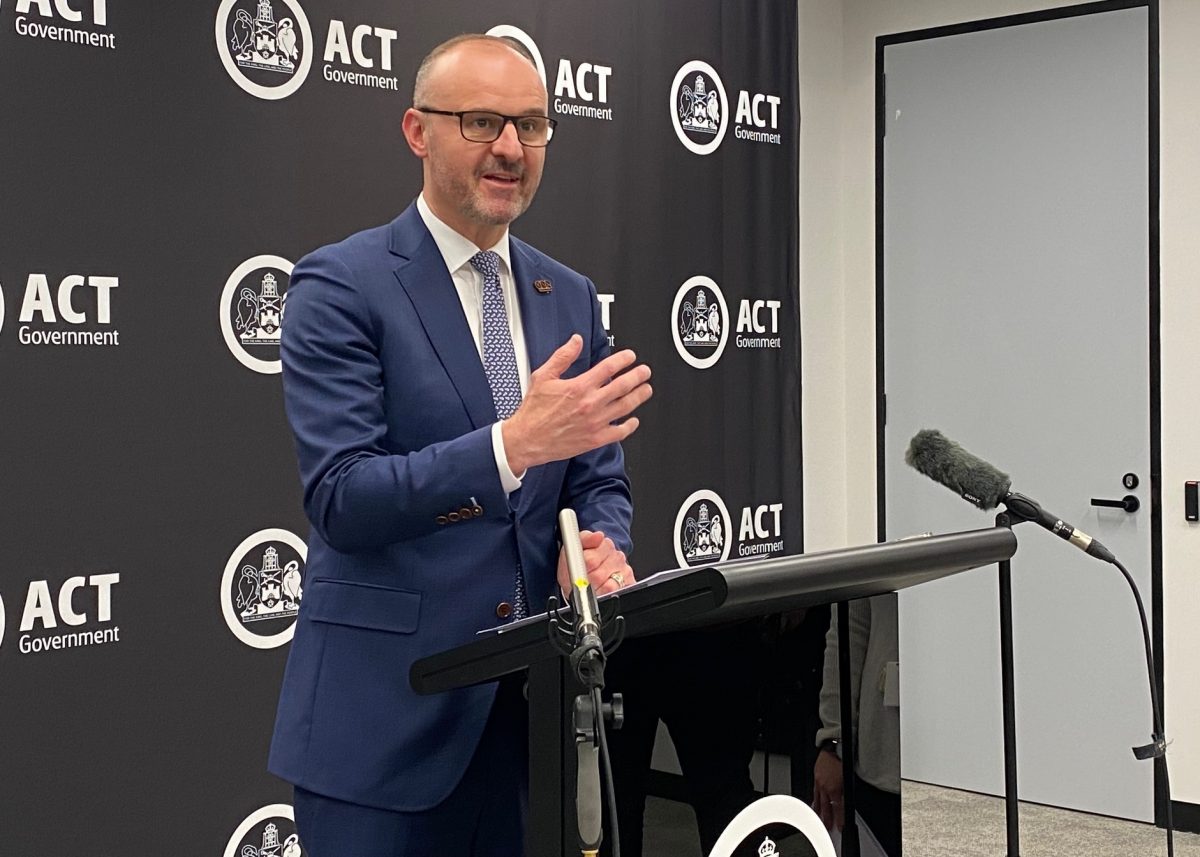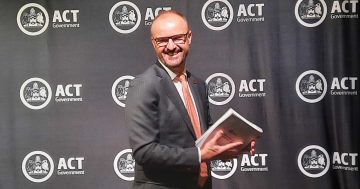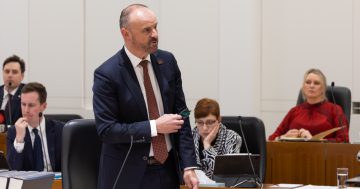
Chief Minister Andrew Barr has argued increasing the Territory’s debt was necessary to allow for capital infrastructure projects. Photo: Claire Fenwicke.
The Territory’s deficits will be “larger and more prolonged than previously forecast”, according to more detail from an S&P Global Ratings report.
But one economics expert has labelled the concerns around the Territory’s downgraded credit rating a “storm in a teacup” and that there’s nothing to see here – for now.
The ACT’s credit rating was downgraded last month for the first time in 20 years from AAA to AA+.
The full report outlines the Territory’s operating budget will return to a deficit in the fiscal 2024 year (ending 30 June) “due to the rollout of cost of living support and rising cost of delivering services”.
“We forecast the Territory’s ratio of debt to operating revenue will reach 154 per cent in fiscal 2026, far exceeding the ratio for all ‘AAA’ rated peers internationally,” the report stated.
“[It’s] our expectation that ACT will incur moderate after-capital account deficits and its debt will be structurally higher than in the past.”
When the report was issued, S&P Global Ratings stated the downgraded rating was because the Territory had a slower fiscal recovery from the COVID-19 pandemic than expected.
However, it predicted the ACT’s budgetary outcomes would “steadily” improve over the next three years, albeit at a slower pace than previously expected.
“ACT’s total tax-supported debt, as a proportion of operating revenues, will peak at 163 per cent in fiscal 2024 and fall slightly to 154 per cent in fiscal 2026,” the report stated.
“Our ‘AA+’ ratings on ACT continue to be supported by its excellent financial management; very high-income economy, which is closely linked to the stable public sector; and exceptional liquidity.”
The Canberra Liberals have accused Chief Minister and Treasurer Andrew Barr of “economic mismanagement”, stating it’s not just the pandemic that caused the Territory to lose its AAA rating.
“When Andrew Barr took the reins as Treasurer in 2011, the ACT had $1.5 billion total borrowings and an annual interest bill of $80 million,” Canberra Liberals leader and shadow Treasurer Elizabeth Lee said.
“By 2026, the Territory’s total borrowings will balloon to $17.4 billion with an annual interest bill of $614 million.
“Canberrans are already paying around $1 million a day in interest costs alone, by 2025 this will be $1.6 million a day.”
Ms Lee also raised concerns about the government’s issued bonds, which are reaching maturity.
She said the government would have to borrow at higher interest rates to pay them off, amounting to $1 billion in the next financial year.
“This is the equivalent of racking up a credit card debt, then getting another credit card with a higher interest rate to pay it off,” Ms Lee said.
“For Canberrans, this means higher rates, land tax, car rego fees, levies and other hidden charges from Andrew Barr with the S&P report even highlighting higher revenue from new tax initiatives going forward.”
Mr Barr said that while total interest expenses were $1 million a day, that was covered by interest on investments and dividend revenue.
“[The money coming in is] nearly double that … it dwarfs the interest payments,” he said.
“Our debt has financed infrastructure, so the choice for Canberra was have no debt, but then we would have had no COVID support package, we would have built no infrastructure over the last 15 years.”
University of Canberra School of Politics, Economic and Society Assistant Professor Craig Applegate said he felt the attention being given to the Territory’s credit rating change was “over-emphasised”.
He explained credit ratings both here and overseas had been reduced in the wake of the COVID-19 pandemic and that while credit ratings are considered when governments are looking to borrow money, the Territory’s drop was so slight it wouldn’t have an impact.
“There’s no real difference between AAA and AA+ rating,” Associate Professor Applegate said.
“If it gets down to the B’s, then that’s a problem, but countries which have that rating include places like Venezuela and others which have real problems.”
He said the Canberra Liberals’ claim that the government would have to borrow money at higher interest rates to pay off debt was not fair as the debt would be rolled over and paid at the same interest rate.
“We’re not being charged a risk premium on the interest we’re already paying,” he said.
At a macroeconomic level, he explained it would make sense for the ACT Government to reduce its deficit at the moment, especially given the Territory’s low unemployment level, so that it would be prepared for the next downturn.
However, he said that wouldn’t be attractive in a political sense.
“Ultimately, over the next 30 years, either taxes have to rise or spending has to be cut, but not in the short run,” Associate Professor Applegate said.
“The government can do nothing and be criticised about the credit rating, or do something and be criticised either about higher rates or lower spending.”
As for the argument that debt had been used for capital infrastructure, Associate Professor Applegate said that was a reasonable point but that it was also easy to classify recurrent spending as an investment.
“If you’re spending money on something that will benefit future generations, it makes sense to fund that through debt rather than taxes,” he said.
“While this is a beat-up, there is a grain of truth that now is a good time to at least reduce either our deficit or our recurrent costs.
“Right now, though, this is a storm in a teacup.”





















